| Listing 1 - 10 of 105 | << page >> |
Sort by
|
Book
ISBN: 9798216098522 1440836493 9781440836497 9781440836480 1440836485 Year: 2019 Publisher: Santa Barbara, California : Greenwood, an imprint of ABC-CLIO, LLC,
Abstract | Keywords | Export | Availability | Bookmark
 Loading...
Loading...Choose an application
- Reference Manager
- EndNote
- RefWorks (Direct export to RefWorks)
"This book is a topical resource that provides a comprehensive look at the most influential women in Hollywood cinema across a wide range of occupations rarely found together in a single volume"--
Book
ISBN: 9788491920083 9783954879373 3954879379 8491920080 Year: 2018 Volume: 4 Publisher: Madrid: Iberoamericana,
Abstract | Keywords | Export | Availability | Bookmark
 Loading...
Loading...Choose an application
- Reference Manager
- EndNote
- RefWorks (Direct export to RefWorks)
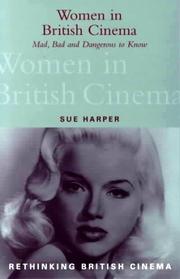
ISBN: 0826447333 Year: 2000 Publisher: New York, NY : Continuum,
Abstract | Keywords | Export | Availability | Bookmark
 Loading...
Loading...Choose an application
- Reference Manager
- EndNote
- RefWorks (Direct export to RefWorks)
Book
ISBN: 9781911239437 1911239430 1911239449 1911239457 1911239465 Year: 2021 Publisher: New York British Film Institute
Abstract | Keywords | Export | Availability | Bookmark
 Loading...
Loading...Choose an application
- Reference Manager
- EndNote
- RefWorks (Direct export to RefWorks)
The 1940 film adaptation of Daphne du Maurier's gothic romance 'Rebecca' begins by echoing the novel's famous opening line, 'Last night I dreamt I went to Manderley again'. Patricia White takes the theme of return as her starting point for an exploration of the film's enduring power. Illuminating Rebecca's production and reception history through archival research and interpretation of robust existing scholarship, she recounts how 'Rebecca', the first fruit of the collaboration between Hollywood movie producer David O. Selznick and British director Alfred Hitchcock, is marked by the traces of women's contributions. The onscreen spell cast by stars Joan Fontaine as the tentative, unnamed protagonist, and Judith Anderson as the brooding Mrs. Danvers, is enriched by the behind-the-scenes labor of women like story editor Kay Brown and screenwriter Joan Harrison, and by the prodigious imagination of du Maurier and her devoted readers. White goes on to provide a rich textual analysis of the film, addressing the gap between perception and reality that is constantly in play in the gothic romance, and highlighting the queer erotics circulating around the heroine, Mrs. Danvers, and the dead but ever-present Rebecca. Her discussion of the film's afterlives in both Classical Hollywood and contemporary cinema, from Citizen Kane (1941) to Phantom Thread (2015), emphasises the lasting aesthetic impact of this dark masterpiece of memory and desire, while her attention to its remakes and sequels speaks to the ongoing relevance of its vision of gender and power.--
Women in the motion picture industry --- History --- Rebecca (Motion picture)
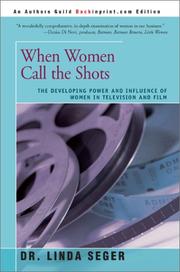
ISBN: 0595268382 9780595268382 Year: 2003 Publisher: New York iUniverse
Abstract | Keywords | Export | Availability | Bookmark
 Loading...
Loading...Choose an application
- Reference Manager
- EndNote
- RefWorks (Direct export to RefWorks)
Record numbers of women are working in all areas of the film and television industries. Actresses are creating their own production companies in order to obtain better roles and more control of their material. Women are creating TV shows to explore stories that more closely reflect their lives. There are more films about women and women's issues, and more money-making films with women protagonists. Change is occurring at every level, and women are clearly having an impact that is reshaping the entertainment industry and the product it delivers. Who better to tell of these changes than script consultant and author Linda Seger. Through interviews with key players such as Sherry Lansing, Dawn Steel, Gillian Armstrong, Marlo Thomas, Linda La Plante, Nora Ephron, Liv Ullman, Loretta Young, Jane Wyman, and many, many others, she shows just what a woman's influence means in what we see - and what we will see much more of in the years ahead - in movie theaters and on our TV screens and how, in turn, that power affects society.

ISBN: 1283205521 9786613205520 1441134980 9781441134981 9781283205528 6613205524 0826447325 9780826447326 0826447333 9780826447333 Year: 2000 Publisher: London ; New York : Continuum,
Abstract | Keywords | Export | Availability | Bookmark
 Loading...
Loading...Choose an application
- Reference Manager
- EndNote
- RefWorks (Direct export to RefWorks)
This book takes a broad perspective and analyses the ways in which the British film industry has dealt with women and their creativity from 1930 to the present. The first part of the book deals comprehensively with different historical periods in British film culture, showing how the 'agency' of production company, director, distribution company or scriptwriter can bring about new patterns of female stereotyping. The second part looks at the input of women workers into the film process. It assesses the work of women in a variety of roles: directors such as Wendy Toye and Sally Potter, producer
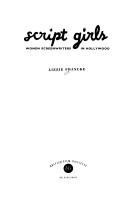
ISBN: 0851704786 Year: 1994 Publisher: London BFI
Abstract | Keywords | Export | Availability | Bookmark
 Loading...
Loading...Choose an application
- Reference Manager
- EndNote
- RefWorks (Direct export to RefWorks)
Women in the motion picture industry --- Women screenwriters --- Biography
Book
ISBN: 9781783205066 9781783205073 9781783205080 1783205075 1783205083 1783205067 Year: 2015 Publisher: Bristol Intellect
Abstract | Keywords | Export | Availability | Bookmark
 Loading...
Loading...Choose an application
- Reference Manager
- EndNote
- RefWorks (Direct export to RefWorks)
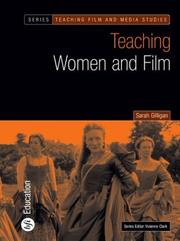
ISBN: 085170980X Year: 2003 Publisher: London : British Film Institute,
Abstract | Keywords | Export | Availability | Bookmark
 Loading...
Loading...Choose an application
- Reference Manager
- EndNote
- RefWorks (Direct export to RefWorks)
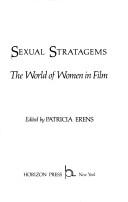
ISBN: 0818007060 Year: 1979 Publisher: New York (N.Y.) Horizon press
Abstract | Keywords | Export | Availability | Bookmark
 Loading...
Loading...Choose an application
- Reference Manager
- EndNote
- RefWorks (Direct export to RefWorks)
| Listing 1 - 10 of 105 | << page >> |
Sort by
|

 Search
Search Feedback
Feedback About UniCat
About UniCat  Help
Help News
News